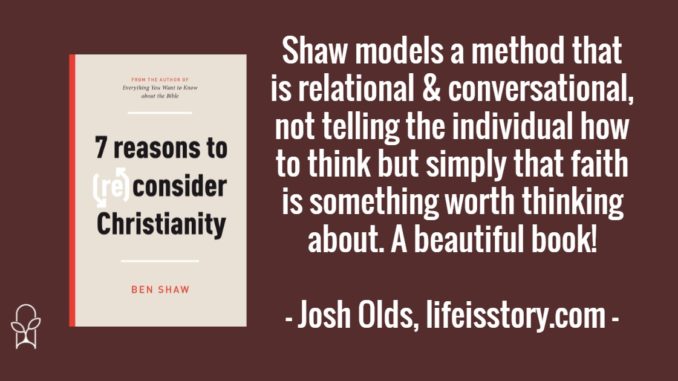
Also by this author: Seven Reasons to (Re)Consider Christianity
Published by Good Book Company on May 1, 2021
Genres: Non-Fiction, Apologetics, Theology
Goodreads

Lots of people assume that Christianity is simply a nice story for kids or a niche hobby for weirdos--or worse, unattractively restrictive.
In this book, Ben Shaw invites skeptical readers to think again. He outlines seven reasons why Christianity is worth considering--or reconsidering--not least because it offers some thought-provoking and rational answers to our deepest questions.
This warm, honest book shows that the Christian message is both more credible and more wonderful than we might have otherwise thought, and calls readers to investigate the person of Jesus for themselves.
Seven Reasons to (re)Consider Christianity isn’t the kind of book I thought it would be—and that’s a good thing. Books like this tend to rehash the same things over and over, giving readers a fairly standard apologetic. Ben Shaw takes that stock format and changes it, not giving the readers The Answer™, but instead focusing on why Christianity is worth testing. And that’s the real difference. The key word is “consider.” Shaw is simply asking readers to consider Christianity as a possible answer to some of the questions they might be asking. In an increasingly secular age—particularly here in the UK—it comes across as a genuine request to individuals who may honestly not see the point of Christianity at all.
The seven reasons that Shaw gives are all phrased as statements. Reconsider Christianity because…
- It’s worth thinking through what life is really all about
- Christianity is a lot more intellectually credible than you might have assumed
- Christianity is about living life to the full
- Christianity gives a compelling answer to the question ‘What’s wrong with the world?’
- Jesus is arguably the most influential person in history
- The death of Jesus is surprisingly very good news for you
- If Jesus really did rise from the dead, it would confirm everything
Notice the path that Shaw’s argumentations take. He begins with generalities: the meaning of life is worth consideration. Life is important enough that we take it seriously and explore our reason for being. We’re not into specifics of Christianity yet, or even religion, really. Shaw’s simply laying the foundation, saying “What if…” and “if so, isn’t it worth checking out?” That’s a powerful philosophical argument that begins where people are and doesn’t ask them to go to far.
From there, Shaw tears down some stereotypes about Christianity: it’s not credible, it’s not fun. Granted, there are Christians who very much portray this kind of Christianity. Shaw says it isn’t necessary. You don’t have to check your brains at the door and you are allowed to have fun. Shaw pokes at the intellectual and sociological barriers to the faith, suggesting that the aren’t great excuses after all.
The next two begin to offer specifics. We can all see that there’s something wrong with the world. The Christian worldview offers a coherent explanation with hope that things will get better. Other worldviews don’t necessarily offer that. And then there’s Jesus—think about how all religions seem to want a piece of him in some form. Isn’t he at least worth considering?
Then we finish with specifics: the death and resurrection of Jesus Christ. Shaw’s Gospel explorations are clear, straightforward, and simple. He presents it as the logical next step for the journey we’ve been on. It’s a powerful build-up that demands a response.
Seven Reasons to (re)Consider Christianity is a book I would gladly hand out to anyone skeptical but seeking. Shaw’s writing is conversational, cogent, and clear. He doesn’t write from a position of authority but from one of sharing knowledge. This is what he has learned and this is what he wants to tell you about it. And if you’re already a believer, this book has great value for showing us how to better evangelize. Oftentimes, the Christian is the greatest barrier to belief that Christianity has. Shaw models a method that is relational and conversational, not telling the individual how to think but simply that faith is something worth thinking about. A beautiful book!



